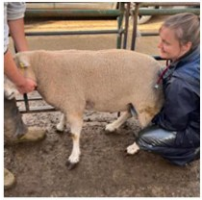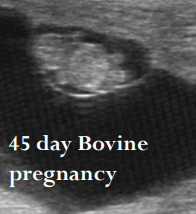September 2025
Haemonchus warning
Haemonchus contortus is a blood sucking worm that lives in the abomasum (the fourth stomach compartment) of sheep. It follows a similar lifecycle to other parasitic worms with a couple key differences:
- Females lay lots more eggs, they can produce around 5,000-15,000 per day
-It has a shorter lifecycle of around 20 days leading to rapid build up on pasture
- It mainly overwinters inside the sheep, instead of on pasture
- Adult sheep are also at risk of infection
Clinical signs:
The main clinical signs to look out for are pale/white eyelids plus condition loss, bottle jaw, collapse when gathering and sudden death. Adult worms can remove 0.05ml blood per worm per day from the host, meaning sheep carrying 5,000 worms can loose up to 250ml per day. Sheep with as few as 500 worms can show clinical signs. The key difference with this worm is it will not cause scour as other worms do.
What to do:
If you are worried about Haemonchus in your flock please get in touch and ask to speak to one of the vets.
Ram fertility testing
Now is the time for your rams to have their MOT pre-tupping. Rams play a significant role in ensuring you meet your target lambing percentages. Tups are often forgotten about till the autumn but are then expected to be fit and fertile athletes for 2 months.
Inspecting your tups now allows you to find and treat any problems early and arrange for replacements to be purchased where required. Sperm production takes around 6 weeks, so early action is required to ensure recovers before tupping.
- TEETH: any issues could affect his ability to maintain condition throughout tupping.
- TOES: lameness does not only affect his ability to keep up with and serve the ewes, but it will also affect his semen quality.
- TESTICLES: he should have two, evenly sized, freely mobile testicles. They should feel like ripe tomatoes and free of lumps or swellings.
- TONE: his body condition score should be 3.5 out of 5.
- TREAT: this is a good time to consider a clostridial vaccine booster or footrot vaccination, we are also recommending all tups are done for bluetongue 3.
Worming/fluke treatments should be based only upon results of faecal testing or advice from the vet. 20-30% of tups are subfertile, meaning they cannot get your ewes in lamb fast enough, resulting in an extended lambing period and/or higher number of barren ewes. Should you have any concerns about your rams, please ask one of our vets to perform a pre-breeding soundness exam where we can perform a ram MOT and an assessment of his sperm quality
Leptospirosis in dogs
Leptospirosis is a bacterial infection of dogs that causes damage to the organs, mainly the liver and kidneys. This causes serious illness and can be fatal. If your dog lives on a farm, goes out on shoots, regularly kills rodents or spends time in water they are at a higher risk of contracting leptospirosis than other dogs. Leptospirosis is also zoonotic, meaning it can be passed onto humans causing Weils disease.
We strongly advise all dogs are vaccinated against Leptospirosis, this is a yearly booster. Around shooting season we also offer kennel cough vaccination for working dogs.
If you would like to discuss this with a vet, please get in contact with the practice.
Scan your cows now to save your winter feed
Efficient reproductive management is at the core of a productive and profitable cattle operation. Due to the lack of grass and feed shortages this year we are recommending scanning your cows for pregnancy earlier. The recommended time to scan your cows would be between 6-8 weeks after taking the bull out. This will allow for earlier detection of barren animals and more efficient usage of feed over winter.





